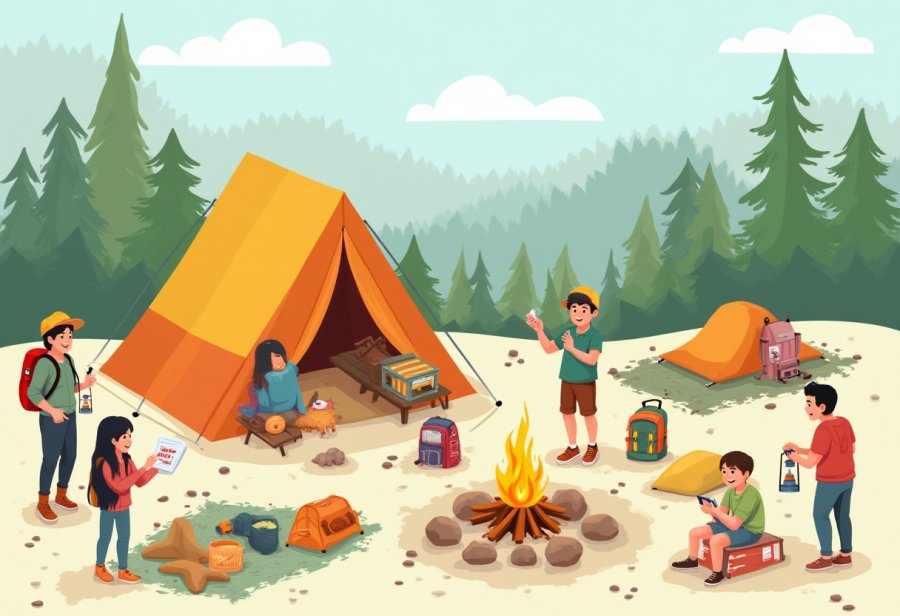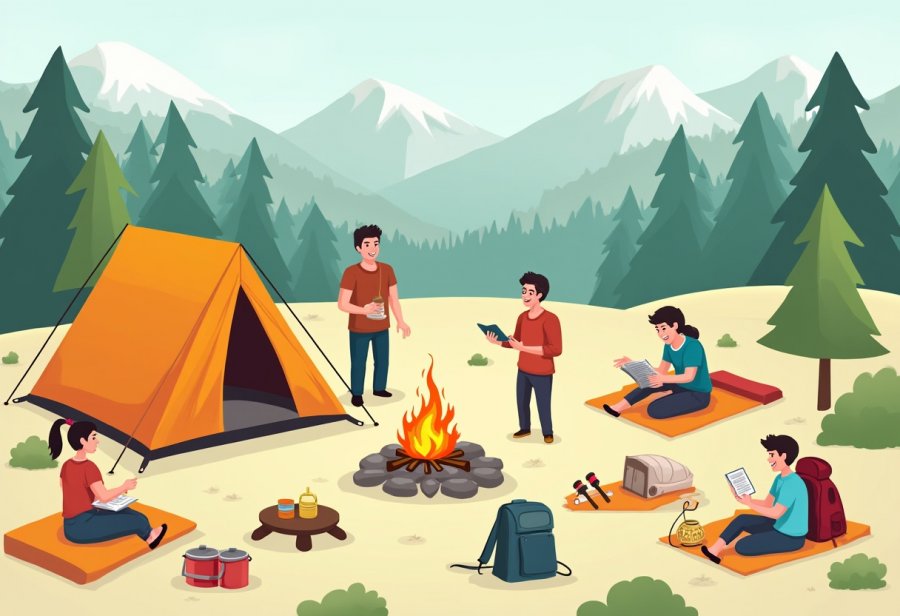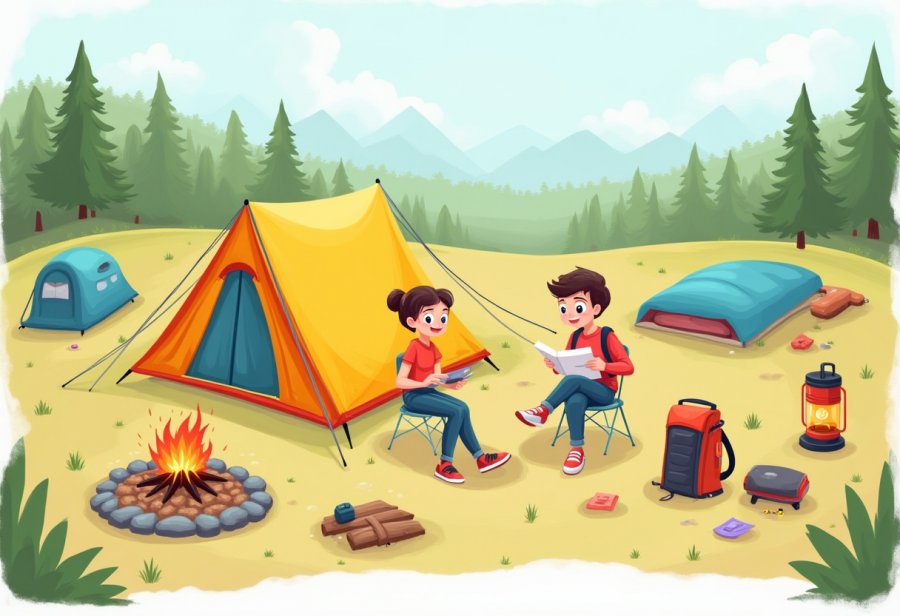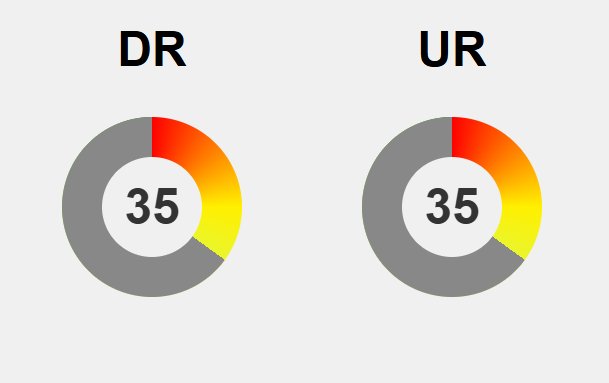
Embarking on your first camping adventure may seem daunting, yet with a shift in mindset, outdoor exploration transforms into a deeply rewarding experience. Imagine stepping away from screens and noise to embrace nature’s serenity—learning, adapting, and growing in the process. This guide highlights how beginners can navigate gear choices, safety, and campsite setup with confidence, turning potential obstacles into memorable stories of resilience and discovery. As technology advances and eco-conscious practices grow, the future of camping promises more accessible, sustainable, and comfortable adventures for everyone. Are you ready to embrace the simple pleasures of the outdoors and unlock a lifetime of exploration? With preparation, patience, and curiosity, camping becomes not just a trip, but a pathway to personal growth and a renewed connection with nature.

Embrace Nature: Discover the Joys of Camping for Beginners
Camping is all about stepping outside your usual routine and immersing yourself in nature. It’s a simple idea: spending a night or more outdoors, usually in a tent, cabin, or basic shelter. For beginners, it offers a refreshing break from screens, noise, and daily stresses. Instead, you get to listen to birds, breathe in fresh air, and enjoy the peaceful rhythm of the natural world. Many find this escape not just relaxing but restorative, giving them a chance to recharge away from the constant buzz of modern life.
What makes camping especially appealing to newcomers is its focus on simple pleasures. There’s no need for fancy gear or luxury accommodations—just a willingness to enjoy nature on your own terms. Whether roasting marshmallows over a campfire or lying back to stargaze on a clear night, these small moments create lasting memories. Plus, camping is often affordable and accessible, whether you’re in a city or suburb, making it a great way to explore new landscapes and reconnect with loved ones.
Starting out can feel intimidating, especially with gear, setup, and outdoor cooking. But the core idea remains straightforward: enjoy nature at your own pace. With a little curiosity and an open mind, you’ll find that nerves quickly fade once you’re out in the open. Many find that the initial learning curve—setting up a tent or packing a backpack—is part of the adventure, not a barrier. Each trip becomes an opportunity to learn and grow more confident in outdoor skills.
Beyond the relaxation, camping offers chances for personal growth. It challenges you to problem-solve, adapt, and embrace the unpredictable. Whether figuring out how to start a fire or navigating a trail, each small success builds confidence. These moments of achievement turn into stories and lessons that make future trips even more enjoyable. Camping becomes not just a getaway, but a journey of discovery—about nature and yourself.
The appeal of camping extends beyond the immediate experience. It’s about slowing down, breathing deeply, and appreciating the simple things—like a crackling fire, a starry sky, or leaves rustling in the wind. For those willing to give it a try, outdoor adventures can become some of the most rewarding moments of life. They open the door to a lifelong love of the outdoors, where every trip offers new sights, sounds, and lessons to cherish.
Plan with Confidence: Your Essential Guide to Preparing for Your First Camping Trip
Getting ready for your first camping trip can feel a bit overwhelming, but a little planning goes a long way. Start by choosing a beginner-friendly campsite—look for spots with basic amenities like clean water, accessible bathrooms, and clear signage. Doing some quick research or reading reviews can help you find a location close to home, giving you a safety net if things don’t go perfectly. Once you’ve picked your spot, create a simple packing list that covers essentials like a tent, sleeping bag, weather-appropriate clothing, and cooking gear. Packing thoughtfully ensures you won’t forget key items and can handle most situations comfortably.
Focus on gear that keeps you safe and comfortable. A sturdy tent and a sleeping bag suited to the forecast are must-haves. Adding a ground tarp or sleeping pad will boost insulation and comfort, especially on uneven ground. Pack layers of clothing, including waterproof options, so you’re ready for changing weather. A reliable flashlight or headlamp is essential for navigating at night, and extra batteries or portable chargers help keep your devices powered. For meals, bring a portable stove, lightweight cookware, utensils, and non-perishable supplies to make outdoor cooking simple. Don’t forget safety items like a first aid kit, insect repellent, and sunscreen to stay protected.
Adopting a positive, flexible attitude is just as important as your gear. Weather can shift unexpectedly, and minor setbacks like gear malfunctions or delays are part of the experience. Viewing these moments as learning opportunities helps you stay calm and adaptable. Keep a lighthearted outlook, and remember that camping is about enjoying the outdoors, not achieving perfection. Being open to improvising often turns challenges into memorable stories and boosts your confidence.
When you arrive at your campsite, take your time finding a flat, clear spot to set up your tent. Following instructions or watching a quick tutorial can make this process much smoother. Secure your shelter well—stability is key to staying dry and comfortable. Inside, organize your sleeping gear and keep essentials within reach so you’re not fumbling around in the dark. As you settle in, explore your surroundings with a short walk or simply listen to the sounds of nature. Small tasks, like safely lighting a campfire or preparing a simple meal, help you feel more at home outdoors.
Safety remains a top priority. Familiarize yourself with local wildlife, weather patterns, and potential hazards before you go. Carry a map or GPS, and always inform someone of your plans. Stick to marked trails, avoid risky activities, and respect wildlife distances. Pack a basic first aid kit and learn how to handle common emergencies. Following Leave No Trace principles ensures you minimize your impact and help preserve these beautiful spaces for future visits. Staying cautious and curious makes your first camping experience both safe and enjoyable.

Start Your Adventure: Step-by-Step Tips for Executing Your First Camping Experience
Starting your first camping trip can feel a bit intimidating, but the key is to stay relaxed and enjoy the moment. When you arrive at your campsite, take your time choosing a flat, open space free of roots or rocks. Watching a quick tutorial or following instructions can make setting up your tent much easier. Make sure it’s pitched securely—stability is crucial for staying dry and comfortable through the night. Once your shelter is up, organize your sleeping gear inside and keep essentials within arm’s reach, so you’re not fumbling in the dark.
As you settle in, take a walk around the area or simply listen to the sounds of nature—birds, rustling leaves, and distant wildlife. These small moments help you connect with your surroundings and ease any nerves. Expect a few hiccups along the way—maybe a stubborn stake or a tricky fire to light. Instead of stressing, see these as part of the adventure. Patience and a positive attitude turn everyday frustrations into funny stories and learning experiences.
Lighting a campfire safely is often a highlight. Gather some dry wood, follow basic safety rules, and enjoy the warm glow that creates a cozy atmosphere. It’s a perfect setting for sharing stories or just relaxing under the stars. Cooking outdoors is another rewarding part—simple meals on a portable stove or over the fire can become memorable highlights of your trip. Take your time, and don’t rush the process; the joy is in the experience.
Getting comfortable outdoors also means accepting that things might not go perfectly. Weather can change unexpectedly, so having extra layers and waterproof gear is smart. If it rains, don’t see it as a setback—cover your gear and enjoy the sound of rain tapping on your tent. Small setbacks, like tangled gear or slow setup, are normal. They teach patience, problem-solving, and resilience, making you more prepared for future trips.
Most importantly, focus on the experience itself. Savor the quiet moments, the starry sky, and the fresh air that fills your lungs. Camping is about immersing yourself in the present, not perfection. Whether you’re sitting around the fire or exploring nearby trails, each moment builds confidence and deepens your connection to nature. The more you practice, the more natural it feels—each trip becoming a stepping stone to outdoor confidence and enjoyment.
As you gain more experience, exploring additional resources can enhance your camping skills. For comprehensive advice and tips, consider visiting REI's camping advice. This can help you prepare for different situations and make each trip even more enjoyable and rewarding.
Learn and Grow: Real Stories of Challenges and Triumphs in Camping
Many first-time campers find that the most valuable lessons come from unexpected challenges. For example, a family once faced a sudden rainstorm that soaked their gear and complicated their setup. Instead of panicking, they learned how to quickly cover their tent with tarps and build a makeshift shelter, turning a setback into a teaching moment. These experiences teach flexibility and problem-solving—skills just as crucial as packing the right gear. They also become stories that boost confidence and resilience for future trips.
Seasoned campers often emphasize that embracing mistakes enriches the outdoor experience. One experienced adventurer recalls a night when a strong gust of wind knocked over their tent. Rather than frustration, they used it as an opportunity to reinforce their stakes and improve their setup techniques. Such stories highlight that camping isn’t about perfection but about adapting and learning from setbacks. Each stumble or surprise becomes a step toward greater outdoor confidence.
Humor and patience are key to turning difficulties into bonding moments. A solo camper once got briefly lost because of confusing trail markers. Instead of feeling defeated, they took a deep breath, retraced their steps, and learned to read maps better. Sharing these stories later reveals how resilience and a good sense of humor make outdoor adventures more meaningful. Mistakes aren’t failures; they’re the foundation for growth and better preparation.
Every trip offers lessons, whether it’s mastering a new skill or handling an unexpected weather change. Each mistake or surprise builds practical skills and confidence. Hearing others’ stories shows setbacks are part of the journey, not signs of failure. Staying curious and adaptable transforms challenges into memorable stories and personal growth. These experiences remind us that camping is as much about learning as it is about enjoying nature.
Real-world stories demonstrate that setbacks often lead to the most memorable moments. A common thread among seasoned campers is how unexpected issues—like gear malfunctions or weather surprises—become opportunities for creativity and patience. Over time, these small hurdles foster resilience and resourcefulness, turning initial frustrations into confidence. They show that the true value of camping lies in overcoming obstacles with a positive mindset.
The ability to handle surprises with calm and humor makes the outdoor experience richer. Whether it’s a sudden rain or a tangled tent, approaching issues lightly keeps the trip fun and stress-free. Each challenge becomes a story worth sharing, often bringing laughter and a sense of achievement. These moments teach that persistence and good humor are as important as planning.
Many seasoned campers stress that mistakes are simply part of the learning process. The more you face unexpected situations, the better you become at managing them. Each challenge faced head-on develops your problem-solving skills and builds confidence. Over time, these stories of overcoming obstacles become your most valued memories and lessons.
Ultimately, the stories from real outdoor adventures show that every trip—even the imperfect ones—contributes to growth. They remind us that setbacks are stepping stones, not roadblocks. Embracing mistakes with patience turns camping from a potential stressor into a source of joy and discovery. The more you learn from each experience, the more confident and eager you’ll be to explore again and again.
Gazing Forward: Innovations and Trends Shaping the Future of Camping
Looking ahead, the future of camping is shaping up to be more innovative and accessible than ever before. Advances in technology are making outdoor gear smarter, lighter, and more eco-friendly. Lightweight tents with built-in solar panels and portable chargers mean you can stay connected even in remote spots without adding weight to your pack. Materials that are sustainable and durable are becoming the standard, helping campers minimize their environmental footprint while enjoying nature. These innovations allow for a more responsible and enjoyable outdoor experience, encouraging conservation and respect for natural spaces.
Emerging tools like virtual reality and augmented reality are starting to influence outdoor adventures. They offer new ways for beginners to learn essential skills or preview destinations from the comfort of home. Practicing navigation, setting up a tent, or identifying local flora and fauna in a simulated environment builds confidence and reduces the learning curve. As these technologies grow more refined, they will help newcomers feel more prepared and eager to explore, making outdoor recreation more inviting and less daunting.
Community-driven efforts and eco-tourism initiatives are also transforming the camping landscape. Many parks and organizations promote responsible travel practices that emphasize Leave No Trace principles. These efforts help protect fragile ecosystems while making outdoor spaces more inclusive. Accessibility features, like wheelchair-friendly campsites and adaptive gear, are expanding opportunities for everyone to enjoy the outdoors. This shift toward inclusivity broadens the camping community, inspiring more diverse groups to discover the joys of nature.
The rise of glamping reflects a new trend—combining comfort with outdoor adventure. Stylish, fully equipped tents and tiny homes offer a luxurious twist on traditional camping, attracting those hesitant about roughing it. This blend of convenience and nature helps draw in a wider audience, including families and urban dwellers seeking a quick escape without sacrificing comfort. As a result, outdoor experiences become more appealing to a broader demographic, fostering a new appreciation for the outdoors.
Looking even further, innovations like connected gear and eco-conscious designs will continue to evolve. Smarter equipment that’s easier to pack and more durable will enhance convenience, while sustainable practices will reduce environmental impact. These developments aim to make outdoor recreation more sustainable and enjoyable, encouraging responsible exploration. As technology and eco-initiatives advance, they will bring new excitement and ease to outdoor adventures, inspiring more people to get outside and explore.
Sharing stories of positive experiences and practical tips will be vital in welcoming new campers. Organized beginner-friendly trips, educational programs, and community support can lower barriers, build confidence, and foster a sense of belonging. Investment in accessible infrastructure and outreach helps newcomers feel more comfortable and prepared. These efforts make outdoor adventures less intimidating, opening the door for a new generation eager to discover the simple joys of camping and reconnect with nature.

Resources at Your Fingertips: Tools and Guides to Support Your Camping Journey
For beginners eager to build confidence and deepen their understanding of outdoor camping, a wide range of resources is available to support your journey. Starting with well-crafted books and beginner guides can make all the difference, offering clear, step-by-step advice on essential topics like tent setup, outdoor cooking, and safety tips. These materials help you learn the basics before your trip, making your first experience smoother and more enjoyable.
Online resources are equally valuable. Dedicated websites and forums provide tutorials, gear reviews, and practical tips that are updated regularly to reflect new products and best practices. Many feature videos and active communities where you can ask questions and share experiences, turning digital platforms into virtual support networks. Engaging with these communities helps you learn from seasoned campers and gain fresh insights, making your learning curve less steep.
Participating in online courses or local workshops offers hands-on experience in critical skills like fire-starting, navigation, and packing efficiently. These sessions often include demonstrations and real-world practice, giving you the confidence to handle common outdoor challenges. Connecting with outdoor clubs and community groups can also open doors to mentorship, where experienced campers are happy to share advice, stories, and encouragement.
When it comes to gear, starting simple is best. Focus on reliable, user-friendly equipment—such as a sturdy tent, a comfortable sleeping bag suited to your climate, and basic cooking supplies. Many brands cater to beginners, offering affordable yet durable options that make outdoor living easier. Safety essentials like a first aid kit, insect repellent, and sunscreen should never be overlooked, as they help ensure your trip remains safe and comfortable.
Getting organized before your trip can save time and reduce stress. Use labeled containers or compartments to keep gear sorted, making setup and packing more efficient. Practice setting up your tent at home to familiarize yourself with the process, which boosts confidence and minimizes delays. Double-check your packing list to ensure nothing important is forgotten, and arrive at your campsite with a clear plan for where to set up your shelter.
Throughout your adventure, don’t hesitate to tap into community knowledge and online resources. Many active forums and websites host experienced campers who are eager to offer advice or share tips. Watching tutorial videos or reading articles on specific topics can clarify doubts and inspire new ideas, helping you feel more prepared. Each bit of knowledge gained makes future trips more relaxed and rewarding, turning outdoor camping into an enjoyable and confident pursuit.




